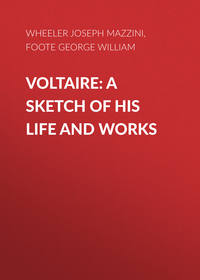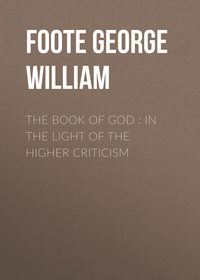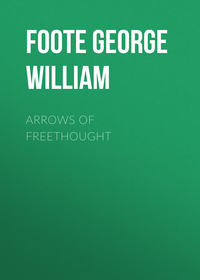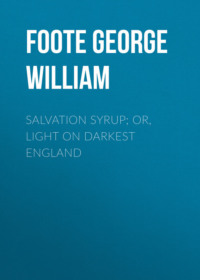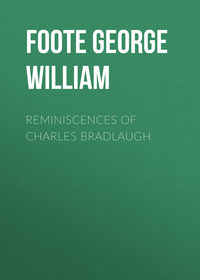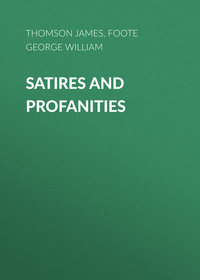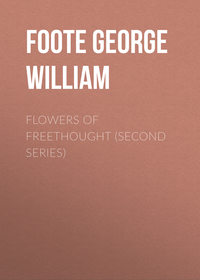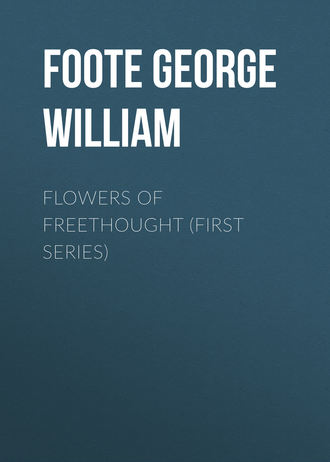 полная версия
полная версияFlowers of Freethought (First Series)
I venture to say in conclusion: Consult the revised version of the Bible for meaning, but read the old one for style. It is a treasury of musical and vigorous Saxon, a well of strong English undefiled; although Hebrew is a poor language, and the Greek of the New Testament is perhaps the worst ever written. But do not think, as Macaulay pretended, that the language of the Bible is sufficient for every purpose. It sustained the genius of Bunyan, but the mightier genius of Shakespeare had to draw from other sources to support its flight. Our English Bible contains six thousand words; Shakespeare's vocabulary contains nine thousand more.
LIVING BY FAITH
What is Faith? Faith, said Paul, "is the substance of things hoped for, the evidence of things not seen." This is a faith that sensible men avoid. The man of reason may have faith, but it will be a faith according to knowledge, and not a faith that dispenses with knowledge. He believes that the sun will rise to-morrow, that the ground will remain firm under his feet, that the seasons will succeed each other in due course, and that if he tills the ground he will reap the harvest. But his belief in these things is based upon experience; his imagination extends the past into the future, and his expectations are determined by his knowledge. The future cannot indeed be demonstrated; it can only be predicted, and prediction can never amount to an absolute certitude; yet it may amount to a height of probability which is practically the same thing. Religious faith, however, is something very different. It is not belief based on evidence, but the evidence and the belief in one. The result is that persons who are full of faith always regard a demand for evidence as at once a heresy and an insult. Their faith seems to them, in the language of Paul, the very substance of their hopes; and they often talk of the existence of God and the divinity of Christ as being no less certain than their own existence.
Properly speaking, faith is trust. This involves a wide latitude beyond our knowledge. If we trust a friend, we have faith in him, and we act upon that sentiment. But we are sometimes deceived, and this shows that our faith was in excess of our knowledge. Sometimes, indeed, it is quite independent of knowledge. We trust people because we like them, or because they like us. This infirmity is well known to sharpers and adventurers, who invariably cultivate a pleasing manner, and generally practise the arts of flattery. The same principle holds good in religion. It was sagaciously remarked by Hume that we ought to suspect every agreeable belief. The mass of mankind, however, are not so fastidious or discriminating. On the contrary, they frequently believe a thing because it is pleasant, and for no other reason. How often have we heard Christian advocates prove the immortality of the soul to the complete satisfaction of their auditors by simply harping on man's desire to live for ever! Nay, there have been many great "philosophers" who have demonstrated the same doctrine by exactly the same means.
Religious faith, to borrow a definition from Chambers's Dictionary, is usually "belief in the statement of another." There are a few mystics who profess to hold personal intercourse with God, but the majority, of mankind take their religion on trust. They believe it because they were taught it, and those who taught them believed it for the very same reason. When you trace back the revelation to its beginning, you always find that it is derived from men who lived a long time ago, or who perhaps never lived at all. Mohammed vouches for the Koran. Yes, but who will vouch for Mohammed?
Thomas Paine well said that what is revelation to the man who receives it, is only hearsay to the man who gets it at secondhand. If anyone comes to you with a message from God, first button your pockets, and then ask him for his credentials. You will find that he has none. He can only tell you what someone else told him. If you meet the original messenger, he can only cry "thus saith the Lord," and bid you believe or be damned. To such a haughty prophet one might well reply, "My dear sir, what you say may be true, but it is very strange. Return to the being who sent you and ask him to give you better credentials. His word may be proof to you, but yours is no proof to me; and it seems reasonable to suppose that, if God had anything to tell to me, he could communicate personally to me as well as to you."
In ancient times the prophets who were thus accosted worked miracles in attestation of their mission; but our modern prophets have no such power, and therefore they can scarcely claim our belief. If they ask us why we reject what they tell us on the authority of the ancient prophets who possessed greater powers, we reply that what is a miracle to those who see it is only a story to those who hear it, and that we prefer to see the miracle ourselves. Telling us that a man rose from the dead is no reason why we should believe that three times one are one; it is only proving one wonder by another, and making a fresh draft on our credulity at every step in the demonstration.
There are men who tell us that we should live by faith. But that is impossible for all of us. The clergy live by faith, yet how could they do so if there were not others to support them? Knaves cannot exist without dupes, nor the Church without subscribers.
Living by faith is an easy profession. Living on faith, however, is more arduous and precarious. Elijah is said to have subsisted on food which was brought him by inspired ravens, but there are few of God's ministers willing to follow his example. They ask God to give them their daily bread, yet they would all shrink with horror from depending on what he sends them.
VICTOR HUGO.5
Two years and a half ago France was mourning the death of Gambetta. Every hostile voice was hushed, and the whole nation bent tearfully over the bier, where a once mighty heart and fervent brain lay cold and still in death. Never, perhaps, since Mirabeau burned out the last of his great life had Paris been so profoundly moved. Gambetta was carried to his grave by a million of men, and in all that tremendous procession no priest figured, nor in all the funeral ceremony was there a word of God. For the first time in history a nation buried her hero without a shred of religious rites or a whisper of any other immortality than the immortality of fame.
France now mourns the death of Victor Hugo, the great poet of the Republic, as Gambetta was its great orator and statesman. These two, in their several ways, did the most to demolish the empire. Gambetta organised and led the Republican opposition, and when the déchéance came, he played deep for the Republic in the game of life and death, making the restoration of the empire an impossibility. But long before the young orator challenged the empire, it was arraigned before the bar of liberty and humanity by the great poet. From his lonely channel rock, in the bitter grandeur of exile, Victor Hugo hurled the lightnings and thunders of his denunciation at the political burglar of France and his parasitical minions. Practical people laughed at him, not knowing that he was more practical than they. They saw nothing but the petty present, and judged everything by its immediate success. He was nourished by sovereign principles, rooted in the depths of the human heart and blossoming in its loftiest aspirations. He was a prophet who chanted his own inspiration to the world, knowing that few would listen at first, but assured that the message would kindle some hearts, and that the living flame would leap from breast to breast till all were wrapt in its divine blaze. He scorned the base successful lie and reverenced the noble outcast truth, and he had unfaltering faith in the response which mankind would ultimately make to the voice of their rightful lord. Great he was as a poet, a romancer and a dramatist, but he was greatest as a prophet. He lived to see his message justified and his principles triumphant, and died at the ripe old age of eighty-three, amid the love and reverence of the civilised world. We are not blind to his failings; he had, as the French say, the defects of his qualities. But they do not obscure his glory. His failings were those of other men; his greatness was his own.
Victor Hugo, like Gambetta, was a Freethinker. We know he professed a belief in God, but he had no theology. His God was Nature, suffused with passion and ideality; and his conviction of "Some far-off divine event, To which the whole creation moves," was only his faith in progress, extended into the remotest future. He was a true Freethinker in his grand assertion of the majesty of reason and conscience. He appealed to the native dignity of the individual, and hated priestcraft with a perfect hatred. Lacking humor himself, and brilliant without wit, he could recognise these qualities in others, and he thought them as valid as his own weapons against the dogmas of superstition. How fine was his great word about Voltaire – "Irony incarnate for the salvation of mankind." Like Gambetta, Victor Hugo is to be buried without religious rites, according to his will. No priest is to profane the sanctity of death by mumbling idle words over his grave concerning what he is as ignorant of as the corpse at his feet. In death, as in life, the Freethinker would confront the universe alone from the impregnable rock of his manhood, convinced that
There is no danger to a man that knowsWhat life and death is: there's not any lawExceeds his knowledge: neither is it lawfulThat he should stoop to any other law.Not only did Victor Hugo will that no priest should officiate at his burial, he ordered that none should approach his bed. But the carrion crows of the death-chamber were not to be deterred by his well-known wishes. The Archbishop of Paris offered to visit the dying heretic and administer to him the supreme unction on behalf of the Church. M. Lockroy, the poet's son-in-law, politely declined the offer. Our newspapers, especially the orthodox ones, regard the Archbishop's message as a compliment. In our opinion it was a brazen insult. Suppose Mr. Bradlaugh wrote to say that he would gladly attend the sickbed of Canon Wilberforce for the purpose of receiving his confession of Atheism; would the orthodox regard it as a compliment or an insult? We fail to see any difference in the two cases, and we know not why impertinence in an Atheist becomes civility in a Christian. Fortunately, Victor Hugo's death-chamber was not intruded upon by impudent priests. His relatives respected his convictions the more as they were Freethinkers themselves. No priest will consecrate his grave, but it will be hallowed by his greatness; and what pilgrim, as he bends over the master's tomb, will hear in the breeze, or see in the grass and flowers, any sign that a priest's benison is wanting to his repose?
DESECRATING A CHURCH
There was a Pantheon at Rome, which was a monument of the religious tolerance of the Empire. It was dedicated, as appears from the inscription on the portico, by Agrippa, son-in-law to the great Augustus, to Jupiter and all the other gods, with the same generosity that prompted the Athenians to erect an altar to the gods that might be unknown. A niche was afforded within its walls to every deity of the provinces whose devotees were willing to accept the hospitality; and Christ himself might have figured with the rest, if his worshippers did not scorn all other gods but their own.
The old Pantheon still exists, and bears the name of the Rotunda. But it is no longer a Pagan temple. It was re-dedicated by Pope Boniface the Fourth, in A.D. 608, to the Virgin Mary and all the saints. Another Pope, a thousand years later, despoiled it of its ornaments, which had been spared by so many barbarian conquerors. He cast some into cannon, and with the rest formed a high altar for the Church of St. Peter.
These alterations were of course justifiable. They were all made in the interest of Christianity. What could be more proper than the transformation of Pagan temples into Christian churches? What more admirable than devoting to the worship of Christ the edifice which had echoed to the tread of the priests of Jupiter? What more pious than singing the praises of Mary and all the saints in a temple where idolaters had celebrated the glories of all the gods and goddesses of Olympus?
Such is Christian logic. But if the temples of one faith may be so transformed, why may not those of another? If Christianity had the right to devote the temples of Paganism to its own uses, why has not modern civilisation the right to devote the temples of Christianity to Secular purposes?
The Church thinks otherwise. It is at present denouncing the secularisation of the Church of St. Geneviève, in order that Victor Hugo, who died a Freethinker and was buried without religious rites, might repose in an unconsecrated place. This building is the French Pantheon. It was secularised during the Revolution, and dedicated by the Republic, not to the gods of religion, but to the heroes of liberty. When the monarchy was restored it was re-consecrated, and purged of the luciferous taint of Voltaire's dust. But now the Republic is once more established on the ruins of monarchy and imperialism, it again secularises the Church of St. Geneviève as a tomb for its mighty dead. The Church is naturally indignant, but its anathemas are powerless. God does not interpose, and the Republic is too strong. Nay, there is even a rumor that the Roman Pantheon may be secularised also, and changed into a national mausoleum, where the youth of Italy may bend reverently before the tombs of such glorious soldiers of progress as Mazzini and Garibaldi, instead of honoring the very counterfeit presentment of fabulous old saints, chiefly renowned for their laziness and dirt.
The Church of St. Geneviève is desecrated, cries the Archbishop of Paris, and special prayers are offered up to that ancient lady in heaven to avert her wrath from the infidel city which has so insulted her. In one sense the Archbishop is right. The Church is desecrated in the strict etymological meaning of the word. It has been converted from sacred to secular uses. But in the secondary meaning of the word the building is not desecrated, but honored, by being made a fit receptacle for the mortal remains of Victor Hugo.
A government decree and the removal of the cross on top of the church were the only steps necessary to its desecration. The consecrated character of the temple is gone. To the carnal eye the structure remains unchanged, within and without, except for the loss of a crucifix; but it is quite possible that a priestly nose would be able to scent the absence of the Spirit. The Holy Ghost has fled, angels no more haunt the nave and aisles, and St. Geneviève hides her poor head in grief and humiliation. No doubt; yet we dare say the building will stand none the less firmly, and if it should ever be pulled down, its materials would fetch as much in the market as if they were saturated with divinity.
Consecration is, after all, nothing but a priestly trick. What sensible man believes that the Holy Ghost, if such a being exist, is at the beck and call of every Catholic or Protestant bishop? Can the "universal spirit" dwell exclusively in certain places? Can the third person of the Trinity have sunk into such an abject state as to dodge in and out of buildings, according as he is wanted or not? Is there any difference that the nose, or any other sensitive organ, can detect between a consecrated church and an unconsecrated chapel? Can the geologist or the chemist discern any difference between the consecrated and the unconsecrated division in a cemetery? Is the earth affected by priestly mutterings? Do the corpses lie any more peacefully, or decompose any more slowly, for the words pronounced over the mould that covers them? Or is there any appreciable virtue in the consecrated water, with which the Protestant and Catholic are alike baptised, and with which the latter sprinkles himself periodically as a preservative against evil? Season finds no difference; it is perceived only by Faith, which may be defined as the faculty which enables a man to see what does not exist.
WALT WHITMAN.6
Walt Whitman's death can have taken no one by surprise. For years he had been at the brink of the grave, and the end comes as a relief. A great soul may be cheerful, or at least serene, in all circumstances; but there is neither pleasure nor dignity in living on as the ghost of one's self.
Few superber specimens of physical manhood than Walt Whitman's have appeared on this planet. "He looks like a man," said Abraham Lincoln, as his gaze followed the poet past a window of the White House. Whitman stood six feet two, his limbs and torso were splendid, and his head was magnificently proportioned. His vitality must have been wonderful, and his health was absolutely perfect until after the War, during which he too assiduously nursed the sick and wounded, to the lasting detriment of his phenomenal constitution. The flame of his life burnt on for another thirty years, but his strength was seriously undermined, and he is far better entitled to be called a martyr than many who have more cheaply earned the distinction.
Walt Whitman's great personality can hardly be disputed. He impressed himself as something colossal on all who came into close contact with him. The magnetism of his presence in the military hospitals was more sanative than the doctors' physic. Men, women, and children felt glad and satisfied in his company. His large, frank, healthy nature radiated a perpetual benediction. One who knew him intimately has said that he never saw upon Whitman's features any trace of mean or evil passions. The man was thoroughly wholesome. Even his occasionally free utterances on sexuality are only sins against decorum. They do not violate nature. He never spoke on this subject with the slobbery grin of the voluptuary, or the leer of prurience. He was at such moments simply unreticent. Meaning no harm, he suspected none. In this respect he belonged to a less self-conscious antiquity, when nothing pertaining to man was common or unclean, and even the worship of the powers of generation was not without dignity and solemnity.
Some of the foremost Englishmen of our time have acknowledged Whitman's greatness and sanity – notably Carlyle, Ruskin, and Tennyson. Mr. Swinburne is the only one who has unsaid his praise.
Tennyson's intimacy with Whitman – always through correspondence – was simply beautiful. A superficial reader of human nature might have inquired what they had in common – the rough, amorphous American poet, and the exquisite English poet, a flower of millenniums of culture. But there is something deeper than form. It is substance. There is something deeper than language. It is manhood. And on the common ground of the deeper things of life, the American and English poets – otherwise so diverse – clasped hands, as it were, across the sundering ocean.
Whitman's claim to be considered a great poet, or even a poet at all, has been the subject of hot dispute. But such questions are not so settled. Only give time enough, and every writer falls by mere gravitation into his proper place, from which all the controversies in the world can never shift him. Where the evidence is largely subjective, as it must be in appraising genius, there is sure to be much in our judgment that is incommunicable. The logic of events, as we say in politics; or the proof of the pudding, as we say in the vernacular; is not so brilliant as logical sword-play, but it has the merit of being decisive.
Whitman's poetry looks strange to a reader accustomed to conventional models. It positively offends his eyesight. The ear may detect a certain rhythm, but where are the set lengths of orthodox versification? Here, however, there lurks a fallacy. Poetry is not the antithesis of prose. The antithesis of prose is verse. Some of the finest and noblest poetry in the world's literature is not cast in rhyme, though rhythm – often subtler than all possible rules – is indispensable. Yet there is something precious in poetical form; ay, and something durable. Many an exquisite lyric, with no great depth of feeling or reach of thought, has come down the stream of time, and will float upon it for ever. No doubt Dr. Johnson was right in calling it a waste of time to carve cherrystones, but precious stones are the more valued and admired for the art of the lapidary. Whitman did not cultivate versification. He almost despised it. He sneered at "dulcet rhymes." Yet this may hinder his access to posterity. Mr. Meredith hints as much in his sonnet entitled "An Orson of the Muse," which surely refers to Whitman. He allows him to be the Muse's son, though he will not wear her livery.
Him, whom he blows of Earth, and Man, and Fate,The Muse will hearken to with graver earThan many of her train can waken: himWould fain have taught what fruitful things and dearMust sink beneath the tidewaves, of their weight,If in no vessel built for sea they swim.That Whitman, however, could do great things with rhythm, and without rhyme, is proved by his "Funeral Hymn of President Lincoln," which James Thomson ranked with Shelley's "Adonais," and Mr. Swinburne called "the most sublime nocturne ever chanted in the cathedral of the world." That this is a great poem, and will live, we have not the slightest doubt. Some other of Whitman's poems will doubtless live with it, but whole masses of his poetry will probably sink to the bottom – not, however, before doing their work and delivering their message.
Because of his want of form, Whitman suffers more than other poets in extracts. We shall make none, but refer the reader to the whole body of his poetry, Some of it is almost wearisome; the rest will repay study. It contains the utterance of a great soul, full of love and friendship, patriotism and humanity, brooding over the everlasting problems of life and death. Untrammelled by schools and systems, Whitman was a true Freethinker. Cosmopolitan as he was, he preached the gospel of individuality.
"This is what you shall do: love the earth and the sun and the animals, despise riches, give alms to everyone that asks, stand up for the stupid and the crazy, devote your income and labor to others, hate tyrants, argue not concerning God, have patience and indulgence towards the people, take off your hat to nothing known or unknown, or to any man or number of men, go freely with powerful uneducated persons and with the young and mothers of families, re-examine all you have been told at school or church or in any book, dismiss whatever insults your own soul; and your very flesh shall be a great poem, and have the richest fluency, not only in its words, but in the silent lines of its lips and face, and between the lashes of your eyes, and in every motion and joint of your body."
Whitman appealed to the brotherhood of all and the dignity of each. He declared he would have nothing which every other man might not have on equal terms. The business of the great poet was "to cheer up slaves and horrify despots." Men, too, should keep in close communion with Nature, yet always feel that they could "be good or grand only of the consciousness of the supremacy within them."
"What do you think is the grandeur of storms and dismemberments, and the deadliest battles and wrecks, and the wildest fury of the elements, and the power of the sea, and the motion of nature, and of the throes of human desires, and dignity and hate and love? It is that something in the soul which says-Rage on, whirl on, I tread master here and everywhere; master of the spasms of the sky and of the shatter of the sea, of all terror and all pain."
America, perhaps even more than England, has need of Whitman's teaching as the poet of Democracy. He derided "the mania of owning things," he scorned distinctions of caste and class, he sang the divineness of comradeship – and, what is more, he practised it. Full-blooded, strong-limbed, rich-brained, large-hearted men and women are a nation's best products, and if a nation does not yield them, its wealth will only hasten its doom and pollute its grave.
TENNYSON AND THE BIBLE.7
We owe no apology for speaking of the dead poet as "Tennyson." This is how he will be known by posterity. The rank is but the guinea's stamp, and in this case it was not requisite. A true poet's gold can neither be made more precious nor more current by empty titles. In our opinion, it is a degradation, instead of an honor, for one of nature's aristocrats to herd with the artificial nobility of an hereditary peerage. We also take the opportunity of regretting that Tennyson ever became Poet Laureate. The court poet should not survive the court dwarf and the court jester. It is painful to see a great writer grinding out professional odes, and bestowing the excrements of his genius on royal nonentities. The preposterous office of Poet Laureate should now be abolished. No poet should write for a clique or a coterie; he should appeal directly to the heart of the nation.




